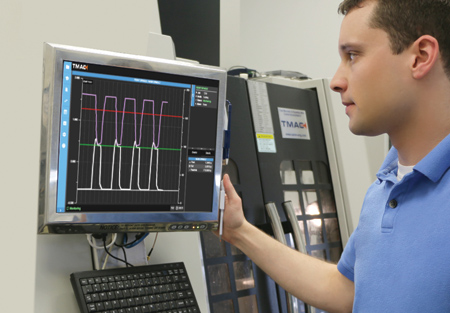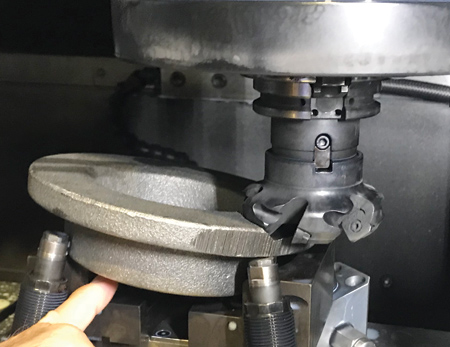
TMAC adaptively controlling feedrate during cutting

TMAC stops machine before next insert with bad robot load
"The necessity for employing smart technology systems in modern day machining is essential to optimize cutting, protect the machine and tooling, and boost production. Choosing and investing in the right technology to automate and advance manufacturing processes can be challenging, particularly if you are in the business of manufacturing pricey parts, have longer cycle times or are machining hard and composite materials. Even with these manufacturing challenges, by integrating smart technology, cycle times can be reduced significantly, machines can run unattended, and tools can be maximized and safely used to their (almost) breaking points," said a Caron spokesperson.
Caron Engineering's Tool Monitoring Adaptive Control (TMAC) system directly interfaces with almost any CNC machine control and utilizes a separate high-speed processor to react instantaneously to conditions and make real-time automatic corrective adjustments during cutting. TMAC monitors true spindle motor power to detect tool wear and breakage in real-time. "Many systems monitor current, which is a non-linear, and therefore, can be a less accurate measurement of tool wear. TMAC learns the peak power and area under the curve (power over time) of the cutting tool and can monitor tool wear based on these parameters," said the spokesperson.
Unattended Operation
One of Caron Engineering's aerospace manufacturing customers had TMAC installed on five horizontal machining centers (HMCs) cutting titanium parts. TMAC has enabled them to get real data off the machines to show the programmers how the machines are reacting to their part programs. To start, TMAC detects worn tooling during operation. Using the adaptive control feature, TMAC automatically slows the feedrate down during rough operations to keep the tool from breaking as it begins to deteriorate, allowing them to cut more parts per tool. These parts also contain a lot of air cutting. TMAC (adaptive control) automatically increases the feedrate in these areas to reduce cycle time. They no longer need to be ultra conservative with their speeds and feeds, knowing TMAC will make the necessary adjustments for them. They are seeing reductions in cycle time of 20 - 26% per machine.
TMAC has also given them the confidence to run their machines overnight and during weekends, at times when there are no operators present. They can load up their pallet system and tool carousels and then walk away for the weekend. If TMAC detects a tool is worn, it will automatically call a redundant tool if it is available in the carousel. The TMAC interrupt program will shuttle out pallets if there is an alarm, to automatically move to the next workpiece, eliminating machine downtime. They return to the shop on Monday and all parts have been cut, or the machine has stopped if TMAC has detected issues or exhausted its tooling and pallets.
Protect the Machine and Tooling
Another customer in the oil and gas industry has fully automated work cells. Unbeknown to the customer, a robot loaded a part incorrectly into the workholding. This customer avoided a devastating crash since the machine was equipped with Caron Engineering's TMAC system monitoring the real-time power load on the tool.
TMAC immediately registered the power spike as the power load deviated from the norm, triggering an alarm. With TMAC's direct interface to the CNC control, TMAC instantly stopped the machine before the next insert even came in contact with the material.
Without any human intervention, Caron Engineering's TMAC system shut the spindle off in time to save all the inserts and workholding.
Boost Production
"The transportation industry is also noticing considerable gains with TMAC," said the spokesperson. A customer machining compacted graphite iron engine block components has two large identical HMCs, running the same part and process. Both machines are running six parts per shift.
The customer implemented Caron Engineering's TMAC system on one of the two identical HMCs. The machine running TMAC saw an immediate cycle time reduction of 25% using the adaptive control option, which automatically adjusted the feedrate through the material cutting process.
In addition, the operators were performing multiple critical checks throughout the process. With TMAC, these manual checks were no longer needed since TMAC runs these checks in real time. By eliminating these manual checks and gaining the ability to run the machine unattended, cycle time on this part was reduced by an additional 16%.
The implementation of TMAC on this machine resulted in a total cycle time savings of 41%. They are now producing 10.2 parts per shift, compared to only six on the identical HMC running without TMAC. This customer has since ordered nine more TMAC systems.
For more information contact:
Caron Engineering, Inc.
116 Willie Hill Rd.
Wells, ME 04090
207-646-6071
marketing@caroneng.com
www.caroneng.com